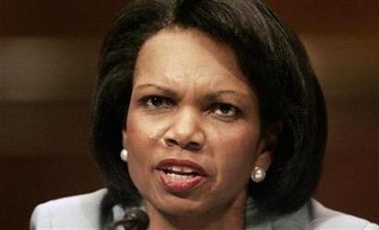US, German ministers to meet Putin amid strains
(Reuters)Updated: 2007-05-15 09:17
MOSCOW - The US and German foreign ministers hold separate talks with Russian President Vladimir Putin on Tuesday expected to touch on a number of simmering disputes between Moscow and the West.
 US Secretary of State Condoleezza Rice testifies before the Senate Appropriations Foreign Operations Subcommittee on Capitol Hill, May 10, 2007. [Reuters]  |
Their talks are likely to cover US plans to build a missile defense shield in Europe as well as a US-backed plan to grant effective independence to the Serbian province of Kosovo after nearly eight years of UN administration.
Russia objects to both proposals, saying it does not see a threat that requires a missile shield in Europe and arguing that to force its ally Serbia to give up Kosovo sets a bad precedent.
Kosovo's fate may also come up when German Foreign Minister Frank-Walter Steinmeier meets Putin to discuss a growing list of disputes involving Russia and new European Union members that were once in the Soviet orbit.
An EU-Russia summit on Friday in the southern Russian town of Samara may be undercut by disagreements over everything from Russia's ban on Polish meat imports to its anger at Estonia's removal of a Soviet monument from Tallinn city center.
Steinmeier conceded on Monday that it was unlikely Russia and the EU would agree at the summit to start negotiations on an ambitious new partnership pact due to cover trade, energy, human rights and foreign policy.
The coincidence of the German and US foreign ministers being in Moscow illustrates Western concern about relations with Russia during a period in which Putin has adopted a more confrontational stance toward the United States and Europe.
Rice is the third top US official to visit Moscow since Putin's February 10 speech in Munich in which he accused the United States of seeking to impose its will on the world.
"I don't like the rhetoric either," Rice said ahead of her talks on Tuesday with Putin and Foreign Minister Sergei Lavrov.
However, she said that Washington and Moscow work well in trying to restrict the nuclear programs of Iran and North Korea and that their dealings were nothing like the "implacable hostility" between the United States and the Soviet Union.
"I know people talk about, throw around terms like new Cold War," she said. "The parallels ... have no basis whatsoever."
Russian officials say they are preparing for calm and positive talks with Rice.
But Moscow -- flush with oil money and once again flexing its muscles as a world power just as Washington is mired in Iraq -- said it would not be dictated to by its US visitor.
|
||
|
||
|
|